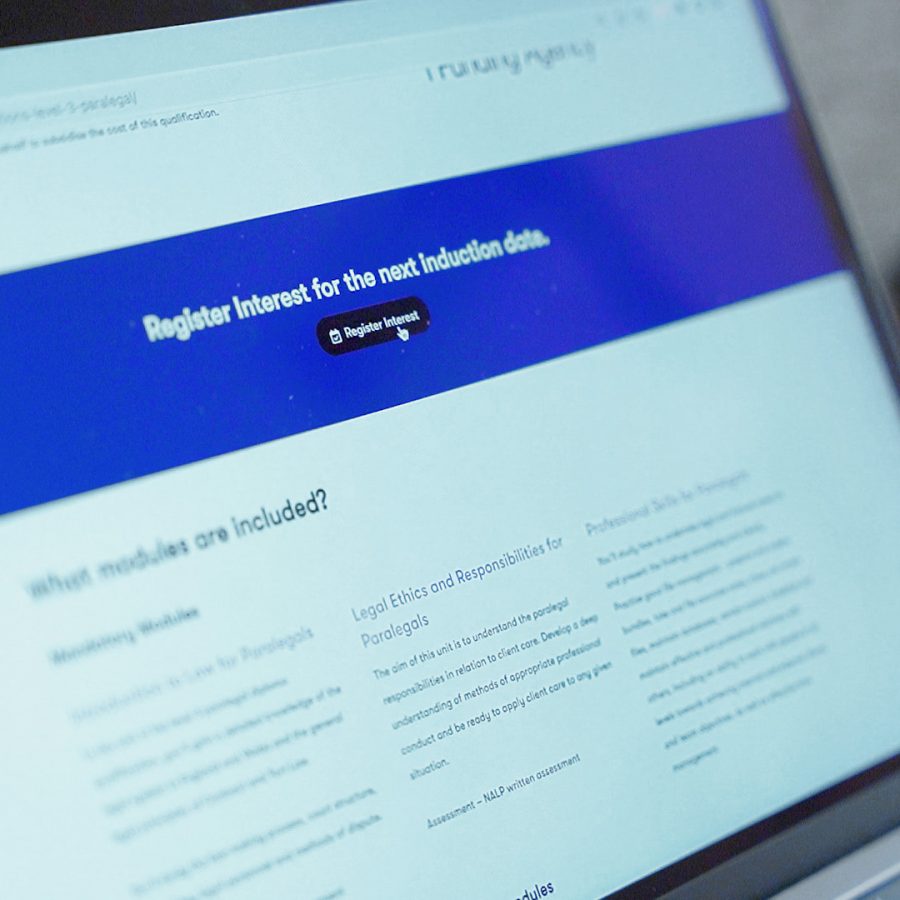Level 7 Solicitor Apprenticeship
For those with a LLB or LLM please visit our Graduate Solicitor Apprenticeship.


Solicitor Apprenticeship Overview
Qualify As A Solicitor Via The New SQE Scheme
Key Features
SQE 1 & 2 exam costs (£4,564) and SQE preparation costs (over £7,200) are covered via 95% Government Funding
- Solicitor Apprenticeships
- 6.5 years duration distance learning apprenticeship
- 80% on-the-job work, 20% education, and training (off-the-job)
- Legal foundation topics and skill modules available online.
- 1-2-1 meetings from your progress tutor to encourage your development and aid in creating a portfolio based on your work
- Finish the weekly assignments you submit, and get comments from your progress tutor.
- Prepare for the Parts 1 and 2 of the new Solicitors Qualifying Examination (SQE)
- After passing the SRA Character & Suitability test, become a qualified solicitor.
- This solicitor apprenticeship prepares students for day 1 as a qualified solicitor.


Curriculum
Part 1: Common Law Method and Ethics
Part 2: Public Law
Part 3: Law of Contract
Part 1: Law of Tort
Part 2: Criminal Law
Part 3: Critical Approaches in Current Legal Issues
Part 1: Land Law
Part 2: Real Estate
Part 3: Business Law 1
Part 1: Equity and Trusts
Part 1 and 2: Access to Justice and Legal Services
Part 2: Criminal Litigation and Evidence
Part 3: Civil Dispute Resolution
Part 1: Business Law 2
Part 1 and 2: Wills and Succession
Part 2: SQE1 Preparation – Functioning Legal Knowledge (FLK) 2
Part 3: Skills Portfolio and FLK 2
SQE 1 Exam
Part 1: SQE1 Preparation – FLK 1, SQE 1 Bootcamp and Examination
Part 2: SQE2 Preparation and Examination
Part 3: LLM Key Practice Areas
SQE 2 Exam (End Point Assessment)
Please note that the curriculum may be subject to change
Entrance Requirements
One of the following is required:
- Level 3 Paralegal Qualification
- 3 A-levels (including law): BBB excluding General Studies ; or
- 2 A-levels (including law): BB excluding General Studies and AS-level: BC taken at the same sitting; or
- BTEC Extended Diploma (in law) : DDM; or
- ACCESS qualification indicating academic strength; or
- A pass in the law units and skills elements of a Foundation Degree; or
- Relevant employer-led work experience; or
- Pass in CILEx Level 6 Law and Practise course or Professional Skills course; or
- Pass in CILEx Level 3 Professional Diploma in Law and Practice; or
- Pass in CILEx Level 3 Certificate in Law and Practice; or
- Pass in CILEx Law School Certificate in Criminal Prosecution, Criminal Justice Administration or DWP/DH prosecutions; or
- CPS Level 3 Certificate in Criminal Prosecution.
Note:
You must have GCSE Maths and English at grade C /4 or above (or equivalent). If you don’t have copies of your certificates to prove this level or you didn’t receive the corresponding GCSE (or equivalent) grades, you will need to take our online functional skills assessment as part of the application procedure. You must receive the following results:
At the end of your first year of study, you must have Level 1 maths function skills and be willing to advance to Level 2 maths.
At the end of your first year of study, you must have English functional abilities Level 1 and be willing to acquire Level 2 English.
You must have received your employer’s support for the apprenticeship and be currently employed in a legal capacity.
You must be eligible to live and work in the UK permanently because apprentices are considered employees.
All aspiring solicitors in England and Wales must pass the Solicitors Qualifying Examinations.
Fees & Funding
The Education and Skills Funding agency (ESFA) has allocated funding to train thousands of professionals in work to gain further occupational qualifications. The ESFA provides 95% of the funding and your practice pays only 5%. As an approved registered government training provider Datalaw can take advantage of this funding on your firm’s behalf to provide legal qualifications.
FAQs
If I have a legal degree or LPC, am I eligible to join the Level 7 Solicitor apprenticeship?
You may be qualified for one of our two Graduate Solicitor Apprenticeship programmes if you already hold a bachelor’s degree in any field with a Grade of 2.2 or above. To learn more please contact our apprenticeship team.
What if I don't have the qualifications required for a Level 7 Solicitor apprenticeship?
Alternatives to A Levels that are acceptable include, for instance, earning a BTEC Level 3 Extended Diploma (formerly known as a BTEC National Diploma), completing a Paralegal Level 3 Apprenticeship, or completing the International Baccalaureate.
What further assistance is offered to me while I'm an apprentice solicitor?
You will be assigned a Progress Tutor and also have access to our resources and apprenticeship platforms.
During my Level 7 Solicitor apprenticeship, will I have a full-time job and be required to study on my own time?
The majority of apprentices work full-time jobs, however 20% of their time throughout the apprenticeship must be spent studying and learning outside of the workplace.
At least one full day of study is required each week for the Solicitor Apprenticeship. Your employer and Law Apprenticeships will decide which day works best. Also, time needs to be set aside for online 1-2-1 meetings and webinars.
Is a Level 7 Solicitor apprenticeship a simpler alternative than full-time university study?
Not necessarily. An apprenticeship can be a worthy challenge that allows you to learn while earning real-world experience and abilities, but it also calls for resilience, organisation, and self-discipline.
If I misplace my exam results, can I still apply for the Solicitor Apprenticeship Program?
You should be able to ask the exam board for a copy of your certificate if you finished your GCSEs or A Levels within the last 30 years. If you took O Level or CSE exams or completed your secondary education outside of the UK, you might need to take a basic functional skills test to make sure you possess the necessary English and Arithmetic skills to enrol in the programme. To talk about your problem, please contact us at the number listed below.
What is the typical starting pay for a Level 7 Solicitor apprenticeship?
The employer will decide on this. The specific employer should be consulted. Remember that apprentices are compensated for both their regular working hours and any associated training.
